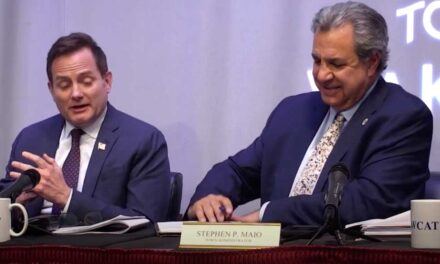Published in the October 4, 2016 edition.
By DAN TOMASELLO
SALEM — Congressman Seth Moulton expressed concerns last week about the United States’ plan to send more troops to Iraq.
The U.S. is sending 615 more troops to Iraq to assist an Iraqi-led battle to reclaim Mosul, the northern city that has been the Islamic State’s main stronghold for more than two years. The offensive will begin as soon as this month.
“These forces will be primarily to enable Iraqi security forces and also (Kurdish) Peshmerga in the operations to isolate and collapse ISIL’s control over Mosul but also to protect and expand Iraqi security forces’ gains elsewhere in Iraq,” said Defense Secretary Ash Carter.
The Peshmerga are Kurdish militia fighters who are generally among the most proficient ground forces in Iraq but whose role is politically sensitive there.
Moulton, who served four tours in Iraq while serving as Marine Corps infantry officer, expressed concerns about the plan initiated by President Barack Obama.
“The U.S. Military is planning to send (615) more troops to Iraq as part of a push to take back Mosul,” said Moulton. “I’m confident they will succeed, but military wins are not enough. We need a plan for maintaining stability in Iraq after our military does its job.”
Carter said the extra Americans would perform multiple roles at multiple locations, including at Qaraya West air base south of Mosul, where they will be building up the base to make it a hub for Iraq forces, and at al-Asad air base in Anbar province more than 200 miles away, where they will strengthen supply lines for the movement of supplies north toward Mosul.
Obama approved the deployment, which Navy Capt. Jeff Davis, a Pentagon spokesman, said would total 615 troops who would begin moving out “very soon.” Although the Americans are not to participate directly in combat, they may in some cases move forward with Iraqi combat forces and could face IS attacks.
There were 4,565 U.S. forces in Iraq as of Sept. 28, according to the Pentagon. That number does not include as many as 1,500 troops who are there on temporary duty or are not counted for other bookkeeping reasons.
Carter underscored the potential risks to all U.S. troops involved in the campaign.
“We’re in a support role but I need to make clear once again: American forces combating ISIL in Iraq are in harm’s way,” he said. “No one should be in any doubt about that.”
Davis said most of the new U.S. troops will do logistics and maintenance, others will provide expanded intelligence and surveillance for the Mosul operation and some will advise and assist the Iraqi and Peshmerga forces. He said improvements at al-Asad air base, for example, could include adding instrument landing systems that would help with nighttime flight operations.
Additionally, Davis said that U.S. and coalition troops may be needed to help ensure that other towns and areas in Iraq remain secure and out of IS control. He said if militants try to launch attacks in other places while the Mosul operation goes on, the Iraqis need to be able to respond.
Iraqi Prime Minister Haider al-Abadi, in a statement posted on his official website, said last week the extra U.S. troops would “provide support for security forces and the Iraqi heroes in the fight looming in the liberation of Mosul.” He said the Obama administration had approved his government’s request for the increase.
Emphasizing that the Americans are there as advisers, Abadi added: “It is our troops who will liberate the land.”
Political strategy needed
Moulton said a long-term political strategy is needed in order to defeat ISIS and unify Iraq.
“We must defeat ISIS,” said Moulton. “But we cannot, in good conscience, continue to send young Americans into harm’s way without a clear plan, not just to win the war, but to ensure the ultimate success of the mission by securing stability and peace. That’s the only way we can bring the troops home for good when they’re done.”
Moulton has been a critic of the Obama administration’s Iraq strategy since he was elected to Congress two years ago. During a recent visit to the U.S. Institute of Peace, he said the Iraqi government needs to institute political reforms aimed at addressing Sunni grievances. He also said the U.S. needs to assist with the reconciliation process between Baghdad and the Kurdish Regional Government and counter Iran influence.
However, Moulton said those efforts will only work if Iraq’s religious, ethnic and tribal constituencies come together.
“This is a tricky issue that a lot of Americans want to push out of our minds and don’t want to talk about,” said Moulton. “At the least, we owe it to our troops. When you ask young people to go halfway around the globe and put their lives on the line for something, they deserve to know what it is. We ought to be able to give them a plan to succeed.”
Moulton recently established a plan he says will be a more effective strategy than simply doubling down on more U.S. troops.
The congressman said a clearly defined political objective is needed in order to defeat ISIS. He said the U.S. must help boost the legitimacy of the Iraqi state by pushing militias to withdraw from cities and towns by “encouraging distribution of political and budgetary authority away from Baghdad.”
Moulton said the U.S. needs to push Iraq to implement political reforms as well. He said the U.S. needs to press Abadi to tackle corruption, particularly by Shia elite, and Sunnis need to have more influence in parliament. Moulton noted “the systematic disenfranchisement of Sunnis” played a major role in ISIS’ advance in 2014.
The congressman said Iraq is dependent on American weapons to fight ISIS and said that leverage should be used to push for political reform. While he said this type of pressure might make recapturing Mosul longer and more difficult, Moulton said there is no post-conflict plan for the city.
“It has been a mistake to provide so much military support to date without demanding any political reforms in return,” said Moulton. “We don’t have a plan for post-conflict Mosul at this point.”
Moulton also said Congress needs to push for a diplomatic-led strategy. He said fewer than 2,000 State Department personnel are now in Baghdad, which is down from 11,500 in 2013. He also said $1.6 billion was cut from security and political assistance plans. He said Congress needs to restore and support non-military initiatives.
— The Associated Press contributed to this report.




